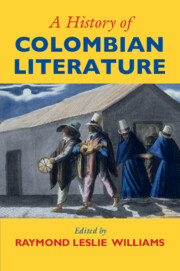Book contents
- Frontmatter
- Contents
- Notes on contributors
- Preface
- Introduction
- PART I LITERATURE AND SOCIETY IN COLOMBIA
- PART II COLOMBIAN CULTURE AND SOCIETY IN REGIONAL CONTEXTS
- 10 Literature, culture, and society of the Magdalena River
- 11 The highland region as seen by an outsider from the inside and an insider from the outside
- 12 Racial fictions: constructing whiteness in nineteenth-century Colombian literature
- 13 Literature and culture in Antioquia: between stories and accounts
- 14 Colombian marginalized literatures
- PART III BEYOND THE BOUNDARIES
- AFTERWORDS
- Index
- References
11 - The highland region as seen by an outsider from the inside and an insider from the outside
from PART II - COLOMBIAN CULTURE AND SOCIETY IN REGIONAL CONTEXTS
Published online by Cambridge University Press: 05 June 2016
- Frontmatter
- Contents
- Notes on contributors
- Preface
- Introduction
- PART I LITERATURE AND SOCIETY IN COLOMBIA
- PART II COLOMBIAN CULTURE AND SOCIETY IN REGIONAL CONTEXTS
- 10 Literature, culture, and society of the Magdalena River
- 11 The highland region as seen by an outsider from the inside and an insider from the outside
- 12 Racial fictions: constructing whiteness in nineteenth-century Colombian literature
- 13 Literature and culture in Antioquia: between stories and accounts
- 14 Colombian marginalized literatures
- PART III BEYOND THE BOUNDARIES
- AFTERWORDS
- Index
- References
Summary
In Literatura fósil (Fossil Literature), published in 1866, the Colombian writer from Bogotá José María Samper (1828–88) bewailed the provincial and derivative qualities of literary production at his time:
Es que vivimos en un aislamiento moral, acaso mas notable que nuestro aislamiento físico; que vejetamos por incomunicacion. Es que nuestra literatura, arrastrada en su curso por la fuerza dominante de la pasion política o personal, carece de fuerza propia i no ha sabido ni podido crearse una existencia libre i autónoma ni formas peculiares. Es que en Hispano-América no hai todavía pueblos, sino apénas poblaciones; i las poblaciones no leen ni meditan, sino que duermen o vejetan: solo los pueblos alimentan las letras.(116)
The author uses isolation, lack of autonomy, and imitation to describe Spanish America; however, his acrid criticism of Modesto Pichón, the fictitious name used for a thriving, yet simpleton writer and politician, makes it clear that Samper is referring to his own environment in the Andean población of Bogotá, capital of the then Estados Unidos de Colombia. The dearth of reflection criticized in this text, and the sleepy and stagnant qualities awakened by personal or political passion described by Samper, mimic the state of affairs in the Andean highland region of Colombia. During this period, political tensions between Conservative and Liberal ideologies marked the urban and the rural milieu with violence and unrest, and the lack of a balanced cosmopolitan and open connection squelched the autonomous production of ideas.
This kind of discouraged outlook, popular in the second half of the nineteenth century, produced a type of solipsistic rendering of the highland region, epitomized by texts akin to the cuadros de costumbres. These texts comment obliquely on issues related to politics, religion, and class, but are imbued with condescending, humorous, or, at best, ironic features. The image produced under this set of narrative features is distorted and tends to render members of society as unsophisticated, naïve, or contemptible, characterizations saimed both at persons of the lower classes as well as at individuals in the higher echelons.
The other possible assessment found in texts at the time is one that examines the region and its inhabitants as subjects of study. This approach also distorts the region's image as it exoticizes features and congeals reality into vignettes. It hinders the reader's potential to understand reality as complex and multifaceted.
- Type
- Chapter
- Information
- A History of Colombian Literature , pp. 238 - 252Publisher: Cambridge University PressPrint publication year: 2016



